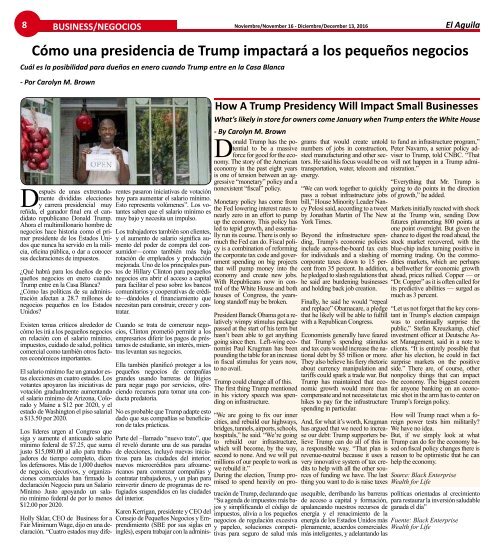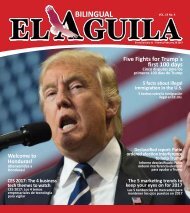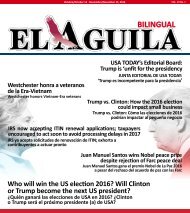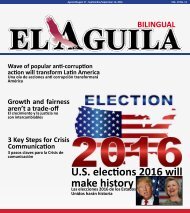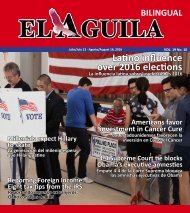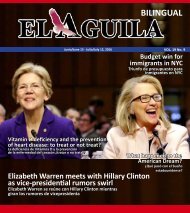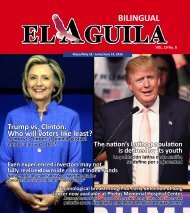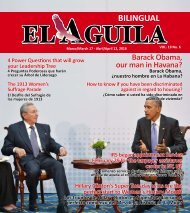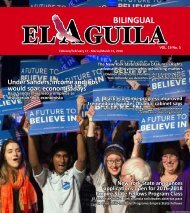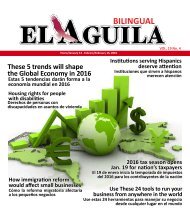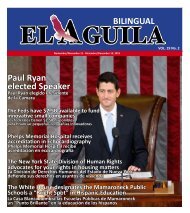El Aguila Magazine – November 16, 2016
You also want an ePaper? Increase the reach of your titles
YUMPU automatically turns print PDFs into web optimized ePapers that Google loves.
8 BUSINESS/NEGOCIOS Noviembre/<strong>November</strong> <strong>16</strong> - Diciembre/December 13, 20<strong>16</strong> <strong>El</strong> <strong>Aguila</strong><br />
Cómo una presidencia de Trump impactará a los pequeños negocios<br />
Cuál es la posibilidad para dueños en enero cuando Trump entre en la Casa Blanca<br />
- Por Carolyn M. Brown<br />
Después de unas extremadamente<br />
divididas elecciones<br />
y carrera presidencial muy<br />
reñida, el ganador final era el candidato<br />
republicano Donald Trump.<br />
Ahora el multimillonario hombre de<br />
negocios hace historia como el primer<br />
presidente de los Estados Unidos<br />
que nunca ha servido en la milicia,<br />
oficina pública, o dar a conocer<br />
sus declaraciones de impuestos.<br />
¿Qué habrá para los dueños de pequeños<br />
negocios en enero cuando<br />
Trump entre en la Casa Blanca?<br />
¿Cómo las políticas de su administración<br />
afectan a 28.7 millones de<br />
negocios pequeños en los Estados<br />
Unidos?<br />
Existen temas críticos alrededor de<br />
cómo les irá a los pequeños negocios<br />
en relación con el salario mínimo,<br />
impuestos, cuidado de salud, política<br />
comercial como también otros factores<br />
económicos importantes.<br />
<strong>El</strong> salario mínimo fue un ganador estas<br />
elecciones en cuatro estados. Los<br />
votantes apoyaron las iniciativas de<br />
votación gradualmente aumentando<br />
el salario mínimo de Arizona, Colorado<br />
y Maine a $12 por 2020, y el<br />
estado de Washington el piso salarial<br />
a $13.50 por 2020.<br />
Los líderes urgen al Congreso que<br />
siga y aumente el anticuado salario<br />
mínimo federal de $7.25, que suma<br />
justo $15,080.00 al año para trabajadores<br />
de tiempo completo, dicen<br />
los defensores. Más de 1,000 dueños<br />
de negocio, ejecutivos, y organizaciones<br />
comerciales han firmado la<br />
declaración Negocio para un Salario<br />
Mínimo Justo apoyando un salario<br />
mínimo federal de por lo menos<br />
$12.00 por 2020.<br />
Holly Sklar, CEO de Business for a<br />
Fair Minimum Wage, dijo en una declaración.<br />
“Cuatro estados muy diferentes<br />
pasaron iniciativas de votación<br />
hoy para aumentar el salario mínimo.<br />
Esto representa volúmenes”. Los votantes<br />
saben que el salario mínimo es<br />
muy bajo y necesita un impulso.<br />
Los trabajadores también son clientes,<br />
y el aumento de salario significa aumento<br />
del poder de compra del consumidor—como<br />
también más baja<br />
rotación de empleados y producción<br />
mejorada. Uno de los principales puntos<br />
de Hillary Clinton para pequeños<br />
negocios era abrir el acceso a capital<br />
para facilitar el peso sobre los bancos<br />
comunitarios y cooperativas de crédito—dándoles<br />
el financiamiento que<br />
necesitan para construir, crecer y contratar.<br />
Cuando se trata de comenzar negocios,<br />
Clinton prometió permitir a los<br />
empresarios diferir los pagos de préstamos<br />
de estudiante, sin interés, mientras<br />
levantan sus negocios.<br />
<strong>El</strong>la también planificó proteger a los<br />
pequeños negocios de compañías<br />
grandes usando barreras de litigios<br />
para negar pago por servicios, ofreciendo<br />
recursos para tomar una conducta<br />
predatoria.<br />
No es probable que Trump adapte esto<br />
dado que sus compañías se beneficiaron<br />
de tales prácticas.<br />
Parte del <strong>–</strong>llamado “nuevo trato”, que<br />
él reveló durante una de sus paradas<br />
de elecciones, incluyó nuevas iniciativas<br />
para las ciudades del interior,<br />
nuevos microcréditos para afroamericanos<br />
para comenzar compañías y<br />
contratar trabajadores, y un plan para<br />
reinvertir dinero de programas de refugiados<br />
suspendidos en las ciudades<br />
del interior.<br />
Karen Kerrigan, presidente y CEO del<br />
Consejo de Pequeños Negocios y Emprendimiento<br />
(SBE por sus siglas en<br />
inglés), espera trabajar con la adminis-<br />
How A Trump Presidency Will Impact Small Businesses<br />
What’s likely in store for owners come January when Trump enters the White House<br />
- By Carolyn M. Brown<br />
Donald Trump has the potential<br />
to be a massive<br />
force for good for the economy.<br />
The story of the American<br />
economy in the past eight years<br />
is one of tension between an aggressive<br />
“monetary” policy and a<br />
nonexistent “fiscal” policy.<br />
Monetary policy has come from<br />
the Fed lowering interest rates to<br />
nearly zero in an effort to pump<br />
up the economy. This policy has<br />
led to tepid growth, and essentially<br />
run its course. There is only so<br />
much the Fed can do. Fiscal policy<br />
is a combination of reforming<br />
the corporate tax code and government<br />
spending on big projects<br />
that will pump money into the<br />
economy and create new jobs.<br />
With Republicans now in control<br />
of the White House and both<br />
houses of Congress, the yearslong<br />
standoff may be broken.<br />
President Barack Obama got a relatively<br />
wimpy stimulus package<br />
passed at the start of his term but<br />
hasn’t been able to get anything<br />
going since then. Left-wing economist<br />
Paul Krugman has been<br />
pounding the table for an increase<br />
in fiscal stimulus for years now,<br />
to no avail.<br />
Trump could change all of this.<br />
The first thing Trump mentioned<br />
in his victory speech was spending<br />
on infrastructure.<br />
tración de Trump, declarando que<br />
“Su agenda de impuestos más bajos<br />
y simplificando el código de<br />
impuestos, alivia a los pequeños<br />
negocios de regulación excesiva<br />
y papeleo, soluciones competitivas<br />
para seguro de salud más<br />
“We are going to fix our inner<br />
cities, and rebuild our highways,<br />
bridges, tunnels, airports, schools,<br />
hospitals,” he said. “We’re going<br />
to rebuild our infrastructure,<br />
which will become, by the way,<br />
second to none. And we will put<br />
millions of our people to work as<br />
we rebuild it.”<br />
During the election, Trump promised<br />
to spend heavily on programs<br />
that would create untold<br />
numbers of jobs in construction,<br />
steel manufacturing and other sectors.<br />
He said his focus would be on<br />
transportation, water, telecom and<br />
energy.<br />
“We can work together to quickly<br />
pass a robust infrastructure jobs<br />
bill,” House Minority Leader Nancy<br />
Pelosi said, according to a tweet<br />
by Jonathan Martin of The New<br />
York Times.<br />
Beyond the infrastructure spending,<br />
Trump’s economic policies<br />
include across-the-board tax cuts<br />
for individuals and a slashing of<br />
corporate taxes down to 15 percent<br />
from 35 percent. In addition,<br />
he pledged to slash regulations that<br />
he said are burdening businesses<br />
and holding back job creation.<br />
Finally, he said he would “repeal<br />
and replace” Obamacare, a pledge<br />
that he likely will be able to fulfill<br />
with a Republican Congress.<br />
Economists generally have feared<br />
that Trump’s spending stimulus<br />
and tax cuts would increase the national<br />
debt by $5 trillion or more.<br />
They also believe his fiery rhetoric<br />
about currency manipulation and<br />
tariffs could spark a trade war. But<br />
Trump has maintained that economic<br />
growth would more than<br />
compensate and not necessitate tax<br />
hikes to pay for the infrastructure<br />
spending in particular.<br />
And, for what it’s worth, Krugman<br />
has argued that we need to increase<br />
our debt: Trump supporters believe<br />
Trump can do all of this in<br />
a responsible way. “That plan is<br />
revenue-neutral because it uses a<br />
very innovative system of tax credits<br />
to help with all the other sources<br />
of funding we have. The last<br />
thing you want to do is raise taxes<br />
asequible, derribando las barreras<br />
de acceso a capital y formación,<br />
apalancando nuestros recursos de<br />
energía y el renacimiento de la<br />
energía de los Estados Unidos más<br />
plenamente, acuerdos comerciales<br />
más inteligentes, y adelantando las<br />
to fund an infrastructure program,”<br />
Peter Navarro, a senior policy adviser<br />
to Trump, told CNBC. “That<br />
will not happen in a Trump administration.”<br />
“Everything that Mr. Trump is<br />
going to do points in the direction<br />
of growth,” he added.<br />
Markets initially reacted with shock<br />
at the Trump win, sending Dow<br />
futures plummeting 800 points at<br />
one point overnight. But given the<br />
chance to digest the road ahead, the<br />
stock market recovered, with the<br />
blue-chip index turning positive in<br />
morning trading. On the commodities<br />
markets, which are perhaps<br />
a bellwether for economic growth<br />
ahead, prices rallied. Copper — or<br />
“Dr. Copper” as it is often called for<br />
its predictive abilities — surged as<br />
much as 3 percent.<br />
“Let us not forget that the key constant<br />
in Trump’s election campaign<br />
was to continually surprise the<br />
public,” Stefan Kreuzkamp, chief<br />
investment officer at Deutsche Asset<br />
Management, said in a note to<br />
clients. “It is entirely possible that<br />
after his election, he could in fact<br />
surprise markets on the positive<br />
side.” There are, of course, other<br />
nonpolicy things that can impact<br />
the economy. The biggest concern<br />
for anyone banking on an economic<br />
shot in the arm has to center on<br />
Trump’s foreign policy.<br />
How will Trump react when a foreign<br />
power tests him militarily?<br />
We have no idea.<br />
But, if we simply look at what<br />
Trump can do for the economy based<br />
on fiscal policy changes there is<br />
reason to be optimistic that he can<br />
help the economy.<br />
Source: Black Enterprise<br />
Wealth for Life<br />
políticas orientadas al crecimiento<br />
para restaurar la inversión saludable<br />
ganada el día”<br />
Fuente: Black Enterprise<br />
Wealth for Life


